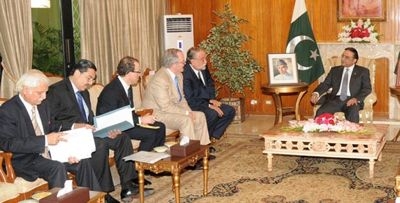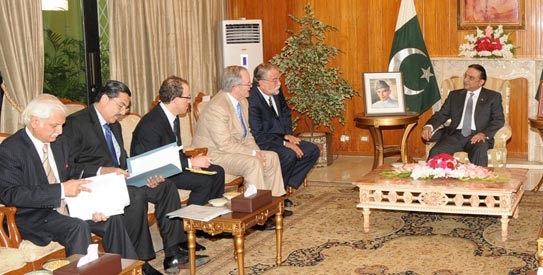News from the Committee to Protect Journalists, May 2011

Pakistan’s president committed to pursue justice for journalists killed in the line of duty, pledging to take steps to reverse the country’s rising record of impunity. A delegation from the Committee to Protect Journalists, headed by outgoing Chairman Paul Steiger, met with President Asif Ali Zardari on World Press Freedom Day. The CPJ group urged him to ensure that journalists are free to report on sensitive issues. The president’s commitment will be monitored by CPJ and national press freedom groups.
At least 15 journalists have died in targeted assassinations in Pakistan since 2002, according to research CPJ compiled and presented to Zardari. The May 10 death of a journalist who had apparently been targeted by militants highlights the urgency to act.
Freed in Burundi
Following sustained public pressure and a prison visit in 2010, CPJ welcomed the release of Burundian editor Jean Claude Kavumbagu, jailed in July 2010. He had been charged with treason for an article criticizing the country’s security forces. He questioned their preparedness to prevent a terrorist attack. Kavumbagu was facing life imprisonment.
In a public letter issued ahead of a hearing in April, CPJ called for Kavumbagu’s release and urged Burundi’s justice minister to intervene.
A CPJ delegation visited Kavumbagu at Bujumbura’s Mpimba Prison in December 2010 and pressed for his release in meetings with Burundi’s first vice president and information minister. Undeterred by his lengthy detention, Kavumbagu plans to start work again at the private online daily Net Press, which he edits, as soon as he can.
Victory in Dagestan
Nadira Isayeva, editor of the independent weekly Chernovik, and four staff reporters were acquitted of extremism charges, a rare victory for press freedom in the Caucasus. Isayeva and her paper had incurred the wrath of security services in Russia’s volatile North Caucasus for relentlessly reporting on heavy-handed anti-terrorism operations. She and the newspaper were regularly harassed with official summonses, financial audits, and state-commissioned “linguistic analyses” that labeled her content as extremist.
Dagestan prosecutors filed charges against Isayeva and her colleagues after Chernovik published in 2008 a series of articles critical of regional police and the Federal Security Service (FSB). In the articles, Isayeva and her colleagues contended that the anti-terrorism operations, carried out by the two agencies in Dagestan, have fueled the rise of militant Islam in the region. If convicted, she faced up to eight years in prison and the four other reporters charged would have faced two years each. CPJ awarded Isayeva an International Press Freedom Award in 2010.
Also in Russia, a May conviction and sentencing of two defendants in the 2009 double murder of freelance journalist Anastasiya Baburova and human rights lawyer Stanislav Markelov was a landmark victory in the fight against impunity in press killings in Russia. Here is more about their cases.
Fortifying CPJ’s work
The philanthropic investment firm Omidyar Network announced on World Press Freedom Day (May 3) an $800,000 grant for CPJ. The gift will support CPJ’s general operations and the expansion of the organization’s global advocacy with a special focus on defending press freedom online.
“We are honored to have been chosen for this generous grant,” said CPJ Executive Director Joel Simon. “Over the past 30 years, CPJ has tackled increasingly diverse and complex attacks on the press. The Omidyar grant will help us push the frontiers of media freedom in the digital age, which is empowering citizens with information.”
The grant provides welcome support at a time when the ability to report online without fear of reprisal faces severe obstacles–many governments are extending their censorship tactics to the virtual world by spying on dissident journalists, identifying their sources, and hacking news websites.
Pushing for freedom on May 3
To mark World Press Freedom Day 2011, CPJ published “The 10 Tools of Online Oppressors,” a special report on the most threatening tactics to suppress online journalists and bloggers as well as the countries making exemplary use of these censorship tools.
CPJ was active in commemorations around the world, with Internet Advocacy Coordinator Danny O’Brien, who authored the report, as a speaker on “Censorship Without Borders,” a panel discussion about new technologies and the spread of online censorship tools held in Washington.
In Mexico City, CPJ representative Mike O’Connor was part of a debate on mobilizing against impunity, and in Brussels, CPJ Senior Advisor Jean-Paul Marthoz took part in a public hearing by the European Parliament regarding the protection of journalists. Middle East and North Africa Program Coordinator Mohamed Abdel Dayem joined the Yahoo Business and Human Rights Summit, and our East Africa consultant, Tom Rhodes, was part of a two-day conference in Nairobi hosted by UNESCO.
Freedom, detention, and disappearance in the Middle East
The recent release of foreign journalists held in Iran and Libya is a positive development in a region where the press has been under attack since social upheaval began in Tunisia. However, CPJ continues to be alarmed by restrictions and reprisals faced by the press in both countries.
Iran released Al-Jazeera journalist Dorothy Parvaz, who holds U.S., Canadian, and Iranian citizenship. In Libya, the released journalists are: Americans James Foley and Clare Morgana Gillis along with Manuel Varela of Spain.
At least 34 journalists remain imprisoned in Iran, which along with China, is the world’s top jailer of journalists, according to CPJ research. The journalists freed in Libya were held since early April, when freelance photographer Anton Hammerl also went missing. With the release of the journalists came the news that Hammerl was shot and killed by Libyan government forces. CPJ and Human Rights Watch are calling for an investigation and for his remains to be released to the family. Fifteen journalists continue to be held or are missing in Libya, CPJ research shows.
Since unrest began, CPJ has documented 526 attacks on journalists, with 13 fatalities throughout the Middle East and North Africa.
Prioritizing Security
Journalist Security Coordinator Frank Smyth helped lead two international workshops. At a conference in Norway in April held by the Norwegian Institute of Journalism, Smyth addressed recent attacks in North Africa and the Middle East, and noted that journalist security is an evolving field that needs to better incorporate issues from sexual assault to digital security. At a meeting in northern Iraq in May sponsored by the Independent Media Centre for Kurdistan, Smyth addressed a mixed audience of Kurdish journalists and authorities. Drawing in part upon his own experience in the region 20 years before, he underscored that press freedom and journalist safety go hand in hand.
Upcoming events
Index launch: CPJ’s 2011 Impunity Index and accompanying report, which spotlight countries where journalists are slain and their killers go free, will be released on June 1. Impunity is a key indicator in assessing levels of press freedom and free expression in nations worldwide. First published in 2008, the index identifies countries where journalists are murdered regularly and governments fail to solve the crimes. The widely cited index is compiled as part of CPJ’s Global Campaign Against Impunity, which is underwritten by the John S. and James L. Knight Foundation.
Film screening: CPJ has teamed up with Human Rights Watch for the New York premiere of “IMPUNITY,” a documentary about the search for justice in Colombia. The film will be followed by a Q&A with filmmaker/journalists Hollman Morris and Juan José Lozano. Showings are on: June 22 at 6:30 p.m., June 23 at 9 p.m., and June 24 at 4 p.m. at the Film Society of Lincoln Center’s Walter Reade Theater. Through a series of testimonies, footage of paramilitary crimes, and interviews with victims and experts, the brutal history of paramilitary violence comes to light. Click here for more information.
Donate
CPJ’s Distress Fund provides emergency grants to journalists facing persecution for their work. Support our work and make a donation online today.
Best of the CPJ Blog
Following disaster, Free Press Association of Japan launches
Rwanda’s Kagame and journalist get into Twitter spat
Q&A: Filmmaker talks Ai WeiWei and jailed activists
Online news agency cautiously thrives in Russia
